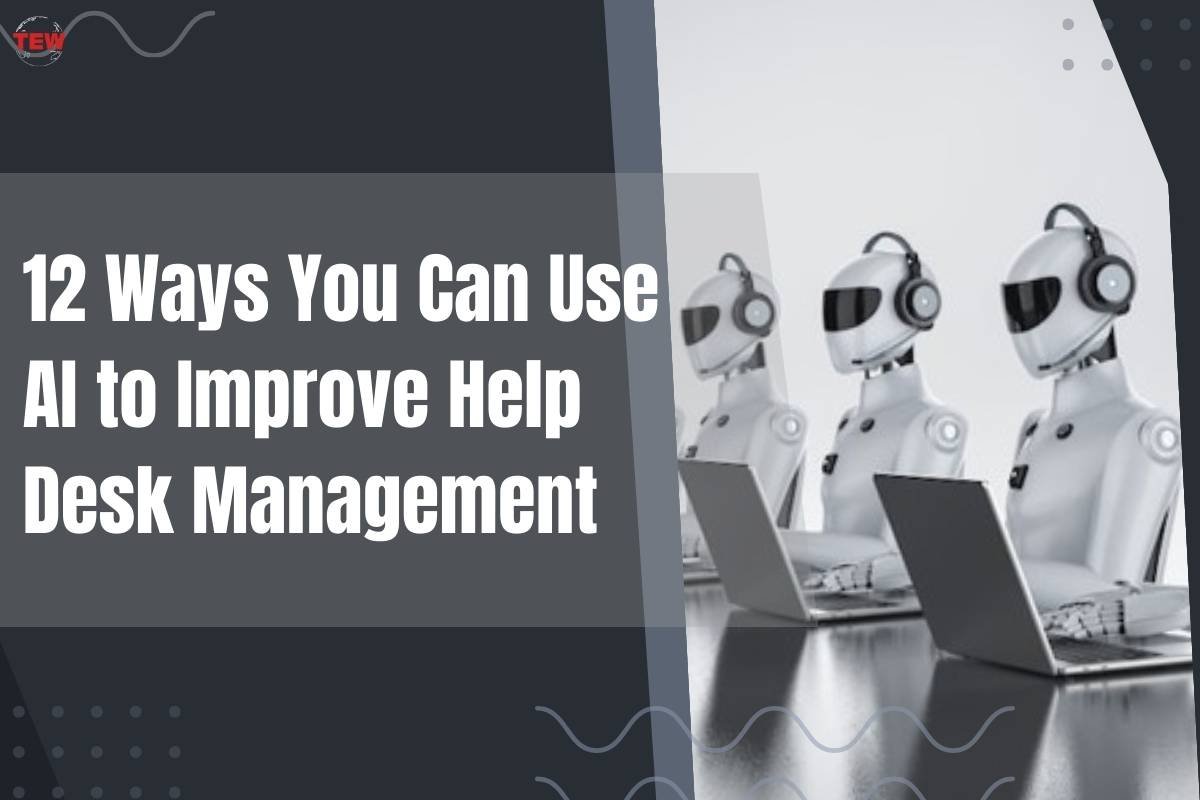The use of Artificial intelligence (AI) has skyrocketed in the last few years. As of now, almost all fields are influenced by AI-based models, and it is helping in the revolution of many industries. The main reason behind this is the growth the businesses are experiencing in the post-COVID era. While growing exponentially, businesses are supposed to manage and automate a lot of tasks in order to not lose all the finances in hiring a person for every task.
One such area where AI is doing wonders is the help desk of any business. With multiple practices and set patterns, AI helps the help desk staff in keeping up with the customers and their queries without breaking a sweat. The help desk solutions based on artificial intelligence can save a lot of time by minimizing the resolution speed.
Moving forward in this article, we will talk about the 12 ways you can use AI to improve Help Desk Management. But before that, we will try to understand the importance of efficient help desk management and the role of AI in enhancing help desk operations.
Importance of efficient help desk management
- First things first, efficient help desk management reduces the workload for the teams so that they can work on other tasks on priority.
- Another major aid is that a proper help desk management system helps streamline the workflow. From receiving the ticket to assigning and then submitting the result to the customer, everything happens seamlessly.
- It also contributes to making the experiences of both customers and employees better. For employees, it reduces the workload and makes the tasks smooth. For customers, the turnaround time for their query is reduced.
- An efficient help desk management system also helps in building the brand image and lets the customers trust a particular organization. It is a universal fact that happy customers are the ones who remain loyal to the brand in the long run. And one of the significant factors that helps in keeping the customers in touch is providing them solutions for any queries instantly.
Role of AI in enhancing help desk management

None of us can deny the fact that AI is playing a major role in the betterment of all industries (we are not saying there are no drawbacks). In terms of help desk management, AI has aided businesses in scaling productivity, wooing customers with personalized solutions, and offering a 24×7 support system. One of the most commonly used AI models in help desk management is the integration of chatbots.
These bots can help in holding human-like conversations, assist customers, help employees with their queries, and generate leads. Big or small, most of the businesses nowadays use a chatbot to know exactly what the customer is looking for. Elements like sentiment analysis also help in understanding the tone of the customer, thus finalizing a response time for their issue. Not only this, but AI also helps the agents working in the help desk department to get their tasks done at lightning speed.
12 Ways You Can Use AI to Improve Help Desk Management
AI-Powered Ticketing Systems
An AI-powered ticketing system works to manage the inbound customer support tickets. The main objective behind this is to tag tickets, assign tickets to the designated agents, and set the priority on these tickets. In most of the cases, the AI understands the tickets as well followed by responding to them automatically based on the training it has received. Furthermore, it also helps the customers get 24/7 support in multiple languages without getting stuck in a chain of mail that goes on for eternity.
And the story doesn’t end here; the AI-powered ticketing system also helps in letting the agents manage repetitive tasks without getting bored and decreasing the backlog as soon as they can. Ai ticketing systems can also be integrated with Customer Relationship Management (CRM) software as Zoho CRM Plus, HubSpot, and more. In the long run, this practice helps the agents understand the whole context of a query raised by a customer and how it should be tackled in the most appropriate way.
Automated Chatbots for Instant Support
Help desk management teams use chatbots to take the customer experience to a whole new level. These chatbots help in finding the data from the intranet and then provide it to the customer quickly. Let’s understand it with an example: suppose there is a customer looking for a generic query to be resolved regarding a product. So, instead of the agents digging the data, AI chatbots can get the information from the tech stack applications of the business and cut the turnaround time considerably.
Keeping all that in mind, we can say that automated chatbots provide the team free time to focus more on tasks that are human-centric. And if your business is booming, then there are a lot of chances that you will need more manpower, which will require spending more money. With automated chatbots, you can increase support by investing a lot in hiring multiple resources.
AI-Enhanced Knowledge Base
In simple terms, an AI knowledge base is a repository for information that comes hinged with AI tech in the current era. The AI knowledge base is dynamic in nature, and it is pretty different from the static repositories like how-to guides, FAQs, and articles. The AI knowledge base uses natural language processing and machine learning to get a hold on customer feedback and website behaviour.
All the organizations using AI-knowledge bases have faster response times, and this is more than important considering how impatient the world is becoming with every passing day. And if the AI will do the work of using the information from the knowledge base and provide it instantly, then the customers will not have to wait for agents to get their queries resolved.
Predictive Analytics for Issue Prevention

In help desk management, predictive analytics help in analyzing the data by using the latest algorithms and predicting customer behavior along with defining future needs. It works on the collection and processing of large amounts of historical data gathered from multiple resources and contact channels. The predictive analytics collect data like the purchase frequency of a customer, length of relationship with the brand, average purchase value, and other factors to decide whether the customer is going to use the services in the future or not.
If the predictions are on the negative side then the company can indulge in following the practices that will not let the customers leave their product. Moreover, the same can be used to find out the customers who spend more than average on the products of a brand. This will help in offering these big ticket customers with personalized offers so that they remain loyal to the brand.
Sentiment Analysis for Customer Feedback
Sentiment Analysis for customer feedback is something the brands cannot sleep on. By doing the sentiment analysis. Brands can now see the positives and negatives related to their product. For example, if there is feedback related to the homepage of a website that it is not user friendly, then the particular organization can work on making it better and go up on the user-friendly aspect in order to let customers know that the brand is listening and thoroughly working to resolve their queries.
It is based on three main things – fine-grained analysis, emotion detection, and aspect-based sentiment analysis. In fine-grained analysis, the polarity score of the words used by the customers is measured, which ranges from very negative to very positive. Aspect-based sentiment analysis deals with breaking the text into parts like phrases and tokens and further measuring the sentiment bundled with them. Emotion detection is something that works on analyzing and identifying the mood of the customers.
Personalized Customer Experiences
Personalized customer experiences are something that helps maintain the customers’ sense of loyalty towards the brands. According to a study shared by Twilio in 2022, 98% of companies (on a global level) mentioned that personalized customer service plays a vital role in increasing customer loyalty, and around 83% of the customers have also agreed to the same.
Personalized customer experiences play a major role in increasing customer loyalty along with referrals for a brand, sometimes pushing a customer into impulse buying and establishing deeper relationships. One of the best ways to offer personalized services to your customers is by greeting them with their names. This practice can be coupled with things like using customer data for a better grasp of their preferences and taking their feedback seriously. Not only this, but an omnichannel experience will also help in boosting the customer experience.
AI-Powered Reporting and Analytics
Before AI came into play, digging all the customer data was a tough nut to crack. Well, the picture changed as soon as the AI-powered reporting and analytics tools became a reality. These tools help organizations get actionable insights regarding their customers.
The best part about the same is that along with data mining, AI can also process a hefty load of insight in a matter of seconds. This information can be used by businesses to know the interests of their customers along with a deeper dive into other details. With the help of this information, the organizations can influence the brand campaigns to get appropriate results.
Automated Ticket Resolution

Automated ticket resolution aids in help desk management with fast-paced ticket remediation. The feature understands what the customer is looking for and then offers relatable solutions. Most of the ML and AI-powered ticket management systems can pull off customer service tasks with ease. The automated ticket resolution also increases efficiency by minimizing the number of repeating tickets. They also help in getting a hold of customer trends and behavior, further helping in improved data categorization.
The use of Artificial intelligence (AI) has skyrocketed in the last few years. As of now, almost all fields are influenced by AI-based models, and it is helping in the revolution of many industries. The main reason behind the same is the growth the businesses are experiencing in the post-covid era. While growing exponentially, businesses are supposed to manage and automate a lot of tasks in order to not lose all the finances in hiring a person for every task.
Virtual Agents for Tier-1 Support
An AI-powered virtual agent is much better than the chatbots that are being used by most organizations these days. An AI-powered virtual agent can easily address the queries of the customers and the potential ones with messages that say that their issue has been addressed and will soon be responded to. Most of the AI-powered virtual agents are based on natural language processing (NLP) and machine learning.
Furthermore, the virtual agents can also automate tier-1 support interactions, deflect regular issues, and provide the organization with the time to work on high-value tasks. In addition, it also helps the real time agents in providing the complete summary of service requests, insights to acceleration resolution, smart triaging, etc.
AI-Driven Training and Onboarding
Now, this is something no one talking about AI in help desk management can sleep on. The onboarding of employees can be automated with the help of AI, and it can also be followed by their training. Undoubtedly, seamless onboarding of employees puts the foundation of regular growth of a particular segment in an organization. There are multiple corporate training software based on AI that include this future.
It also allows the organization to let the newcomers become familiar with the company culture, understand the policies in action, and gain the required skills and knowledge to grow in their designated fields. The icing on the cake is that AI-driven training and onboarding also skyrocket employee satisfaction and retention graphs. This could be your answer to how you can make employee training stick.
Security and Compliance with AI
Artificial Intelligence aids in compliance with data security-based protocols by using predefined rules working on the type of document and information. This also consists of documents that need signature (or we can say review), particularly in the documents containing identifiable information data. The mentioned data is a part of a confidential client engagement or subject to the retention policy. AI can simply identify the relevant category of information and implement predefined conditions followed by automatically eradicating the scope of manual error.
Author’s voice
So, these are the few ways in which artificial intelligence can help improve help desk management setups. The way AI is growing, we will surely get to see more use cases of the same in help desk management as well as other fields of work. To get all this in a single place, you can dive deeper into the details of the best IT helpdesk software so that you know what you are going to get and what you want for your organization.




